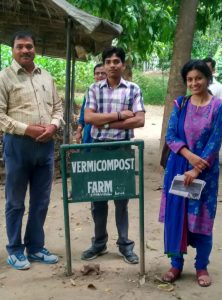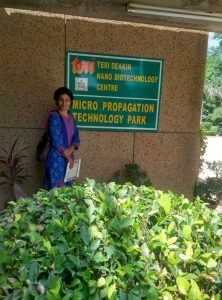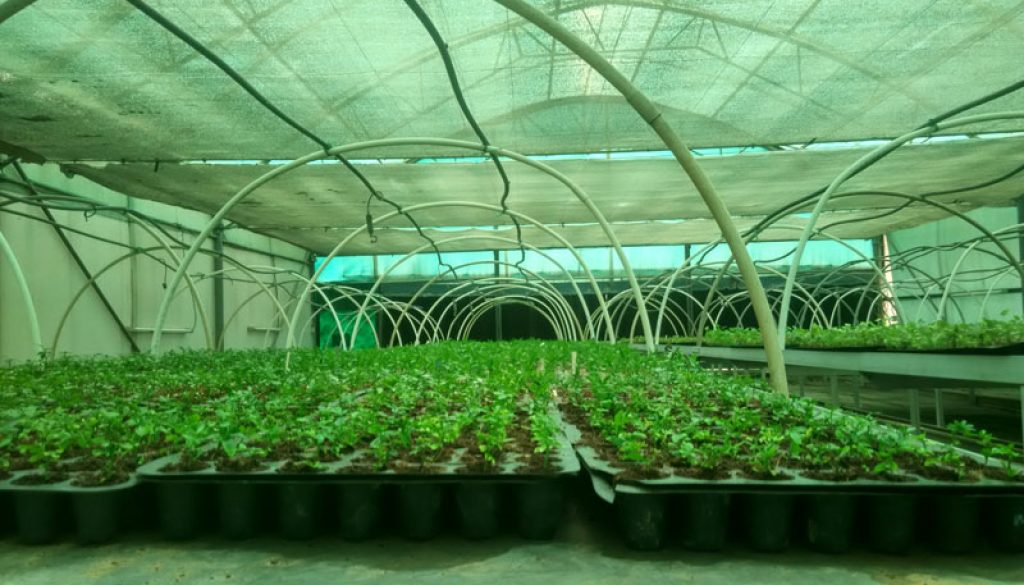A Visit To TERI-The Energy And Resources Institute, Gwal Pahari, Gurgaon
The faculty member, Dr. Nidhi Didwania, Department of Biotechnology, FET, MRIU visited TERI-The Energy and Resources Institute, Gwal Pahari, Gurgaon recently.
 Micropropagation, simply means producing identical plants by culturing plant tissues or organs under sterile conditions. For mass propagation of forest species, the DBT has set up two tissue-culture pilot plants in 1989, one of them being at TERI’s facility at Gwal Pahari, Gurgaon. In December 1997, the Gual Pahari plant was upgraded into an MTP (Micropropagation Technology Park) to give it a larger mandate–mass produce economically important plant species, including forest trees, fruit and cash crops, medicinal and aromatic plants, and so on. MTP (Micropropagation Technology Park) where millions of saplings are born, multiplied, raised, and seasoned to weather the world out there. Mr. Dharmbir Singh Tomar, A.M (Marketing) at MTP showed us TERI’s highly aseptic laboratories that produce microbe-free plants making the international transit for these plantlets smooth. Large-scale field demonstrations by TERI prove reassuring for forest officials, private growers, breeders, seed company officials, and others who invest in its expansive services. Amongst other things, the MTP supplies superior-quality tissue-cultured plants, conducts contractual research/production of plants, inoculates tissue-cultured plantlets with efficient mycorrhizae biofertilizers; offers post-delivery field care; and even helps entrepreneurs set up laboratories, greenhouses, and so on.
Micropropagation, simply means producing identical plants by culturing plant tissues or organs under sterile conditions. For mass propagation of forest species, the DBT has set up two tissue-culture pilot plants in 1989, one of them being at TERI’s facility at Gwal Pahari, Gurgaon. In December 1997, the Gual Pahari plant was upgraded into an MTP (Micropropagation Technology Park) to give it a larger mandate–mass produce economically important plant species, including forest trees, fruit and cash crops, medicinal and aromatic plants, and so on. MTP (Micropropagation Technology Park) where millions of saplings are born, multiplied, raised, and seasoned to weather the world out there. Mr. Dharmbir Singh Tomar, A.M (Marketing) at MTP showed us TERI’s highly aseptic laboratories that produce microbe-free plants making the international transit for these plantlets smooth. Large-scale field demonstrations by TERI prove reassuring for forest officials, private growers, breeders, seed company officials, and others who invest in its expansive services. Amongst other things, the MTP supplies superior-quality tissue-cultured plants, conducts contractual research/production of plants, inoculates tissue-cultured plantlets with efficient mycorrhizae biofertilizers; offers post-delivery field care; and even helps entrepreneurs set up laboratories, greenhouses, and so on.
He shared his experience that TERI helped popularize strawberry cultivation in non-hilly areas by mass-multiplying day-neutral varieties obtained from overseas and making them available to growers at affordable prices. Cash crops have particularly been helped. More than 2.7 million plantlets/microtubers/ minitubers of different potato varieties (low-sugar content and high dry matter) specially meant for making potato chips were supplied to the industry and farmers.
 He discussed that though the cost of tissue-cultured plants is variable (it can range from 5 to 15 rupees, depending upon the species and the number of plants required), they prove to be the right choice because of their high quality. After all, identifying superior plants amongest a population and mass-cloning them is a step forward in reducing pressure on limited land resources and an endeavour to green the earth faster and better.
He discussed that though the cost of tissue-cultured plants is variable (it can range from 5 to 15 rupees, depending upon the species and the number of plants required), they prove to be the right choice because of their high quality. After all, identifying superior plants amongest a population and mass-cloning them is a step forward in reducing pressure on limited land resources and an endeavour to green the earth faster and better.
The Park has state-of-the-art infrastructure ranging from modern laboratories and latest equipment, to greenhouses and polyhouses. By December 2003, TERI had supplied over 12.8 million plants to various state forest departments, non-governmental organizations, agro-based companies, and private growers
The next visit was to the Medicinal herbal garden in TERI where great information was provided about different medicinal and herbal plants. A few of the selected plants like Stevia (Stevia anisostemma), Pippali (Piper longum), Kala bansa (Barleria prionites), Brahmi (Bacopa monnieri) etc. were procured from the garden for the purpose of establishment of Medical herbal garden at Manav Rachna International University campus.
The visit to the TERI was helpful and informative as well as very motivating for research in the field of Plant Biotechnology and Ayurvedic approach. The TERI campus was extremely beautiful with a lot of greenery and ecofriendly environment.



